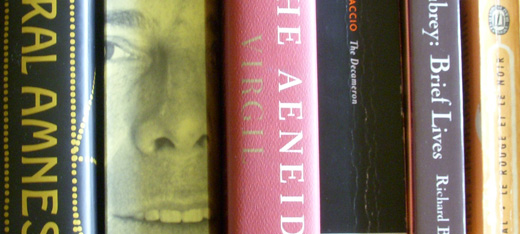Tuesday
Morning Read
¶ Neifile begins the Tenth Day of the Decameron with a story about that earliest of life’s discontents: wanting something just because other people have it. Ruggieri de’ Figiovanni, a Florentine knight, sojourns at the court of the King of Spain. He has no intention of becoming a Spaniard himself, but he resents the King’s liberal handing out of castles and estates to men less illustrious than himself. Interestingly, the story rewards the longing for recognition that underlies Ruggieri’s discontent. Whether canny or sincere, Boccaccio takes pains to appeal to aristocratic readers.
¶ In Aubrey, a pair of American connections. After the oddly insubstantial entry for John Partridge, we get John Pell and William Penn. Everybody knows about Penn, and Aubrey’s account is interesting chiefly for its mention of his wife, Gulielma Maria Springet — a moniker that Aubrey declines to parse.
She early espoused the same kind of person, about 1657. She was a great fortune to her husband, being worth a clear £10,000. Her fortune, quality, and good humour gave her the importunity of many suitors of extraordinary condition, e g Lord Brookes and Lord John Vaughan etc; but valuing the unity of belief and the self denial of her faith above the glories of the world, resisted their motions till Providence brought a man of equal condition to herself to the sincere embracing of the same faith, whose marriage has been crowned with a continued affection.
It almost starts you thinking that Aubrey popped in for breakfast with the happy Penns every so often. As for John Pell, a gifted but unworldly divine who managed his affairs so poorly that he spent time in debtors’ prison, he was the brother of the first lord of the manor of Pelham and the father of the second. Today, the manor of Pelham is known as Pelham Manor. “Pelham” is one of those local names that seem contrived to bewilder non-natives. Pelham and Pelham Manor are adjacent but not-to-be-confused villages in Westchester County, while Pelham Bay Park is a neighborhood in The Bronx — which is not where you’ll find the place that I grew up in, Bronxville.
¶ Reading “Press Release,” from James Merrill’s A Scattering of Salts, makes me wish that I were young, so that I could grow into these lines, which are opaque but pregnant.
There’ve been hours, alone at work,
Or with you last spring, watching the clabber of rapids
Under the bridge reanimate, refigure
The inert shadows we cast, when I felt my side
Pierced by her needle, and knew that in the worksWere disciplines to be mastered proudly, rapidly,
And without fuss.
¶ In Cultural Amnesia, Miles Davis inspires one of Clive James’s more tensile tangents. Having confessed that he’s not a fan of Davis’ minimalist style — “I thought he was using a pipette as a kazoo” — James broaches a discussion of the contingency of artistic freedom upon income. As so often happens in this book, the most pungent comment springs from Soviet example:
In the Soviet Union, royalties existed only in the form of privileges — an apartment, a dacha, the chance to be published at all — but the privileges were decisive. The threat of their being withdrawn was enough to make almost everybody think twice about speaking against the state. Wtihout this point in mind it is fruitless to go on speculating about why Pasternak, for example, was so slow to dissent in public, and was so equivocating when he did. Lovers of the arts should be slow to despise the cash nexus on the artist’s behalf: the niggling difficulties of securing and handling one’s personal finances are nothing beside the pressures of state patronage. Going to hell in your own way has everything over being sent there at a bureaucrat’s whim.
Idealistic youths, especially, ought to memorize the last line, which expresses a profound human truth.

